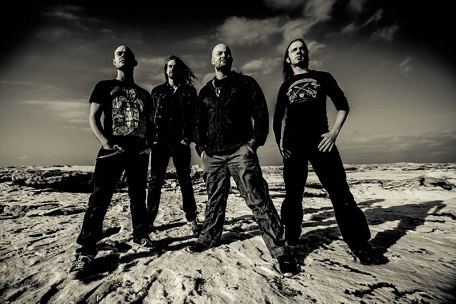Dead Rhetoric: Let’s go back into those early 00’s days, such as the Everblack album. What do you recall most about that time? That’s when you got both of the brothers in the band and things started happening for you.
Mølbjerg: It was a very confident era of the band, actually. We had a stale period where we felt we weren’t sure what was happening, but when we started to write the Everblack album and had a huge pre-production where we had Morten and Mikkel in the studio, we could feel the songs growing. We felt we could be an international player and were very confident we could get some kind of better record deal [laughs]. There was still a bit of money in it back then, so you could get a decent advance to cover your costs and so on. It wasn’t really a surprise when we got quite a far deal from Hammerheart Records. We were very young, so that’s what I remember – everything seemed new and exciting.
Dead Rhetoric: “Screaming From the Heavens” is a great song from that album; same with “Darkspeed.” You alternated song styles on that album – one song would be heavy, then the next melodic.
Mølbjerg: We really tried to use the range of the band and use the dynamics [and] never make it predictable. Make it a journey where you are challenged as a listener.
Dead Rhetoric: 11 Dreams is the album that most of us in the States got familiar with Mercenary. Is that when that particular era of the band was at its peak?
Mølbjerg: Yeah, definitely. The Everblack was written without Mikkel and Morten in the band; it was written as a four-piece. They came in on top of the album while in the studio, so they went with it as planned, but with 11 Dreams, we wrote that as a six-piece and wrote it for the range of being who we were with Mikkel having a different and unique voice. We went in and explored those dynamics and pushed them as far as we could. Well, some could say we pushed them a bit too far in some places [laughs]. I felt that sometimes. It’s a very unique album.
Dead Rhetoric: Let’s not forget the Kent cover, “Music Non Stop.” You have this song wedged between all of this big and atmospheric numbers, which was definitely unique. Whose idea was it to do the cover?
Mølbjerg: It was actually mine [laughs]. It’s kind of a funny story. I really like the Kent guys; that album is divine. That song, “Music Non Stop,” I was playing the intro riff on the guitar for my kid brother, and I asked him to guess what band it was, and he said, “It sounds like In Flames.” I thought that was funny and I told the guys, who thought the chorus was a metal riff too, and it easily could have been a Mercenary song. So we thought, why not make a cover? We had to backtrack a bit because if you try to record a cover and change the arrangement of a song, you have to get permission from the publishers. We thought that might be really difficult and expensive, so we thought to keep it basic, not make it death metal. The drums patterns are the same, so we did this “in-between” cover version of this. It’s funny – some people really hate it, and some really like it [laughs].
Dead Rhetoric: Losing Kral before The Hours That Remain…that had to be tough considering he and you were the main pillars of the band. Was that a hard one to make as well?
Mølbjerg: Both yes and no, because I think we did a lot of touring in the 11 Dreams album, like two European tours. We wanted to maintain that momentum, but I think Kral lost his enthusiasm probably because he had such very big dreams for the band. Touring wears you out and it’s really slow work, so I think he felt that he would have wanted a year off or two years off, but the rest of us are six people trying to agree on things, and some people weren’t ready to do that or we’d lose whatever momentum we might have had. I don’t know how things would have been if we had chosen a different approach. When we wrote the album, Kral distanced himself and in the end, said he wanted to leave the band because he didn’t feel the energy anymore. In a way, it made the rest of us tighter because we thought we had to pull together and make everything happen.
Dead Rhetoric: It’s your best album, I would say.
Mølbjerg: A lot of people say that. For those who have been followers for many years, it’s between 11 Dreams and The Hours. Maybe I’m getting a bit ahead, the unity that we had, it wore out from the many years of touring and people went different ways mentally, so to speak. People had a different idea of what was happening and what should be happening, and if we should be lucky for the chances we were getting, or things should be so much better.
Dead Rhetoric: Do you keep in touch with Kral?
Mølbjerg: Yeah, I do, and I’ve been texting him back and forth today because we sent him the special edition of the album and he did a short review of it on Facebook [laughs]. It was very kind of him. We did a very limited edition of the new album, which had a wooden handmade cover of the logo inserted into the design. We had ten copies made, but made an eleventh, which was for Kral.


